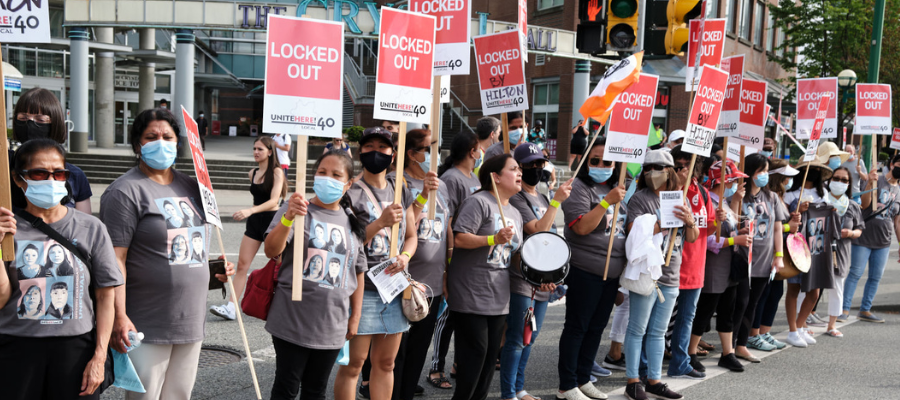A paradox in COVID-19 pandemic recovery: Increased precarity of women hotel workers in British Columbia

Government COVID-19 subsidies were meant to help BC’s hotel sector survive pandemic shut downs, but while the hotel industry is doing better than ever, workers—who are predominantly racialized and immigrant women—are not.
The hospitality and tourism industry is a major driver of BC’s economy, with accommodation room revenues alone generating $3.2 billion in 2019.
Essential to this sector is the work done by older, racialized, predominantly immigrant, women hotel workers who are overrepresented in sales and services roles such as room attendants. These workers have long been underpaid for this physically demanding work with limited upward mobility, yet they’ve made lifelong careers in hospitality by building strong workplace communities to counter the racialized and gendered devaluation of their labour.
In 2020, the COVID-19 pandemic triggered a devastating upheaval in their work lives. Closures and travel restrictions, especially in the first wave of the pandemic, impacted both international and domestic tourism and recreation activities upon which the hotel sector depends. The hotel industry responded to the volatility of tourism and loss of revenue by offloading these economic pressures onto their already precarious workforce through layoffs, understaffing and on-call scheduling.
Approximately 50,000 BC hotel workers were laid-off with little clarity on when or if they would be called back to work. The federal and provincial governments introduced programs to support businesses hard-hit by the pandemic as early as March 2020 with the aim to keep employees on the payroll. The hotel industry benefited from wage and rent subsidies and loans through an array of programs including the Tourism and Hospitality Recovery Program, Canada Emergency Rent Subsidy (CERS), Canada Emergency Wage Subsidy (CEWS), Canada Emergency Business Account, Tourism Relief Fund and the Highly Affected Sectors Credit Availability Program, as well as other support programs by the provincial government. Between March 2020 and May 2021, BC’s accommodations and food services sector received over $1.2 billion in wage subsidies alone.
Unfortunately, these wage subsidies were not conditional on a return to work for laid-off employees. So even while receiving these significant financial supports, hotels eventually terminated many employees who thought they were only on temporary lay-off. And many who were brought back to work as restrictions eased were shifted to on-call scheduling and reduced hours.
This loss of income and employment, meant moderate to extreme financial hardship for women hotel workers. They struggled to meet their basic needs, experiencing increased food and housing insecurity. The unpredictable work scheduling and consequent unreliable income forced many to take other jobs to supplement their earnings, jobs which complicated the challenges of responding to short-notice on-call work.
Changes made by hotels in the name of health and safety, such as reducing cleaning services to reduce worker-customer COVID-19 transmissions; yet in practice, the industry showed little concern for the health and safety of their workforce. Workers reported a lack of personal protective equipment supplies, inconsistent implementation of public health guidelines, and unaddressed concerns regarding abuse by customers. Workers were forced to make the impossible choice between their safety and their livelihoods. For workers who lost their jobs, the loss of extended health benefits added additional financial strain amid a health crisis. These cost-cutting strategies, initially adopted to cushion hotels from pandemic-related revenue losses, persist even as the industry reports a “remarkable” and “exceptional” recovery.
The hotel industry leveraged pandemic emergency measures into permanent cuts to labour costs.
BC’s hotel sector began reporting revenue recovery and increased profit margins as early as 2021, and by 2022 room revenues surpassed pre-pandemic levels and generated $3.8 billion.
Hotel workers, however, have not fared so well. With terminations, understaffing, unpredictable scheduling, and low wages, employment in the sector remains below pre-pandemic levels. In short, the hotel industry leveraged pandemic emergency measures into permanent cuts to labour costs. Now facing self-induced labour shortages, the industry is on a trajectory to drive even more workers away from the sector unless steps are taken to meaningfully improve working conditions and compensation. Instead, the industry has successfully lobbied the federal government to increase the proportion of low-wage workers that they can hire through the Temporary Foreign Worker program to 30%, undercutting the position of all hotel workers.
In summer 2020, unionized hotel workers in BC—mostly women—went on strike to regain their employment. Women staged a hunger strike on the steps of the BC Legislature to urge the provincial government to intervene to protect the jobs of the 50,000 laid-off hotel workers by adopting temporary recall protections that would give them the legal right to return to work as business recovered. The province declined to intervene, citing the primacy of securing recall rights through collective bargaining between union employees and employers even as other North American jurisdictions strengthened and protected hospitality workers rights during the pandemic.
The very low and declining rate of unionization in the hotel industry—3.5% compared to 28.1% across all industries—and the prevalence of precarious employment meant that avenues to fight for a return to work were non-existent for most workers. In BC, there are still hotel workers on strike after over two-and-a-half years.
As the federal and provincial governments reflect on lessons learned from the COVID-19 pandemic and plans for future pandemics and economic downturns, it is important that the voices and experiences of women hotel workers—particularly those at the intersection of multiple inequities—are at the centre of policy discussions. The pandemic highlighted how vulnerable racialized immigrant women workers are to economic downturns because of their jobs in gendered care and service work, precarious conditions of work and unpaid care work at home.
Through their collective actions, hotel workers put a spotlight on an industry that treats racialized women as disposable.
BC’s women hotel workers have demonstrated they are a determined workforce with a strong sense of collective responsibility for their colleagues. However, the federal and provincial governments need to do more to support their agency in the workplace by: safeguarding workers’ right to recall, proactively enforcing workplace rights and safety standards, introducing limits to on-call scheduling, and increasing the minimum wage to a living wage.
These changes are essential for improving gender and racial equity in the workplace and for a more resilient hospitality and tourism sector; which is a major driver of BC’s economy. As the province looks to grow the hotel sector to meet increasing tourist demand, guaranteeing fair work for these women will ensure that revenues generated from hospitality in the province are more equitably shared.
This is an edited excerpt of a joint study by the Canadian Centre for Policy Alternatives, UNITE HERE Local 40 and Simon Fraser University researchers. Read the full report, A Paradox in COVID-19 Recovery: Increased precarity of women hotel workers in British Columbia, by Alice Mũrage, Stefanie Machado, Alexandra Selinger, Michelle Travis and Julia Smith.
Topics: Employment & labour, Immigrants & refugees, Poverty, inequality & welfare, Racism & racial justice, Women



